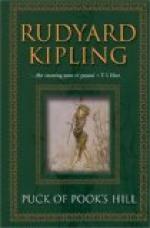WELAND’S SWORD
Puck’s Song
See you the dimpled track that runs,
All hollow through the wheat?
O that was where they hauled the guns
That smote King Philip’s
fleet!
See you our little mill that clacks,
So busy by the brook?
She has ground her corn and paid her tax
Ever since Domesday Book.
See you our stilly woods of oak,
And the dread ditch beside?
O that was where the Saxons broke,
On the day that Harold died!
See you the windy levels spread
About the gates of Rye?
O that was where the Northmen fled,
When Alfred’s ships
came by!
See you our pastures wide and lone,
Where the red oxen browse?
O there was a City thronged and known,
Ere London boasted a house!
And see you, after rain, the trace
Of mound and ditch and wall?
O that was a Legion’s camping-place,
When Caesar sailed from Gaul!
And see you marks that show and fade,
Like shadows on the Downs?
O they are the lines the Flint Men made,
To guard their wondrous towns!
Trackway and Camp and City lost,
Salt Marsh where now is corn;
Old Wars, old Peace, old Arts that cease,
And so was England born!
She is not any common Earth,
Water or Wood or Air,
But Merlin’s Isle of Gramarye,
Where you and I will fare.
The children were at the Theatre, acting to Three Cows as much as they could remember of Midsummer Night’s Dream. Their father had made them a small play out of the big Shakespeare one, and they had rehearsed it with him and with their mother till they could say it by heart. They began when Nick Bottom the weaver comes out of the bushes with a donkey’s head on his shoulders, and finds Titania, Queen of the Fairies, asleep. Then they skipped to the part where Bottom asks three little fairies to scratch his head and bring him honey, and they ended where he falls asleep in Titania’s arms. Dan was Puck and Nick Bottom, as well as all three Fairies. He wore a pointy-eared cloth cap for Puck, and a paper donkey’s head out of a Christmas cracker—but it tore if you were not careful—for Bottom. Una was Titania, with a wreath of columbines and a foxglove wand.
The Theatre lay in a meadow called the Long Slip. A little mill-stream, carrying water to a mill two or three fields away, bent round one corner of it, and in the middle of the bend lay a large old Fairy Ring of darkened grass, which was the stage. The millstream banks, overgrown with willow, hazel, and guelder-rose, made convenient places to wait in till your turn came; and a grown-up who had seen it said that Shakespeare himself could not have imagined a more suitable setting for his play. They were not, of course, allowed to act on Midsummer Night itself, but they went down after tea on Midsummer Eve,




